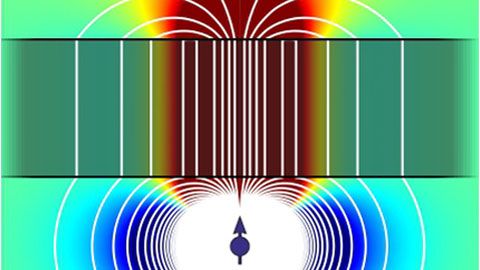
10/07/2014
An international team of scientists led by researchers from the UAB creates the world's first magnetic hose
An international team of scientists led by researchers from the UAB creates the world's first magnetic hose
An international team of scientists led by researchers from the Department of Physics of the Universitat Autònoma de Barcelona (UAB) which the Barcelona Synchrotron Park works with, has developed a material which guides and transports a magnetic field from one location to the other, similar to how an optical fibre transports light or a hose transports water.
Participating in the research, published late June in the prestigious Physical Review Letters magazine , were Carles Navau, Jordi Prat and Àlvar Sànchez, from the Department of Physics of the Universitat Autònoma de Barcelona; Oriol Romero Isart, from the Institute for Quantum Optics and Quantum Information of the Austrian Academy of Sciences and lecturer at the University of Innsbruck; and the recent winner of the prestigious Wolf Prize in Physics Juan Ignacio Cirac, from the Max Planck Institute of Quantum Optics in Garching, Germany.
UAB press release
Participating in the research, published late June in the prestigious Physical Review Letters magazine , were Carles Navau, Jordi Prat and Àlvar Sànchez, from the Department of Physics of the Universitat Autònoma de Barcelona; Oriol Romero Isart, from the Institute for Quantum Optics and Quantum Information of the Austrian Academy of Sciences and lecturer at the University of Innsbruck; and the recent winner of the prestigious Wolf Prize in Physics Juan Ignacio Cirac, from the Max Planck Institute of Quantum Optics in Garching, Germany.
UAB press release
More news
18/06/2020
Eurecat, at the cutting edge of plastronics
03/06/2020
Barcelona will be connected to one of the longest subsea fiber optic cable in the world
20/05/2020
Hub B30: a useful platform
07/05/2020
We are a territory of innovation
16/04/2020
Alba synchrotron: the double life of electrons
02/04/2020
Alba synchrotron: 10 years at the service of the society









